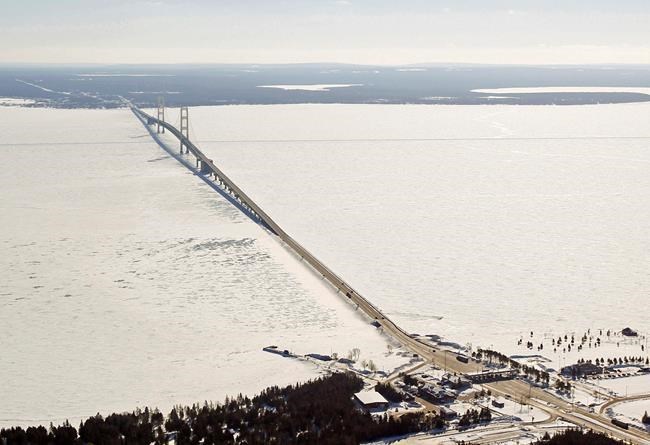
FILE - This Feb. 11, 2014 aerial file photo shows a view of the Mackinac Bridge, which spans a 5-mile-wide freshwater channel called the Straits of Mackinac that separates Michigan's upper and lower peninsulas. Officials say hundreds of gallons of potentially toxic coolant fluid have leaked from electric power cables in the waterway that links Lake Huron and Lake Michigan. (Keith King/Traverse City Record-Eagle via AP, Pool, File)
Republished April 06, 2018 - 11:57 AM
Original Publication Date April 06, 2018 - 8:01 AM
TRAVERSE CITY, Mich. - A marine vessel may have caused a leak of coolant fluid from submerged electric cables into the waterway that connects Lake Huron and Lake Michigan, the U.S. Coast Guard said Friday.
About 600 gallons (2,270 litres) of a synthetic mineral oil used for insulation escaped into the Straits of Mackinac earlier this week after two power cables owned by American Transmission Co. were damaged. None of the spilled material has been spotted on the surface or along ice-encrusted shorelines. The Coast Guard said it probably was diluted in the 5-mile-wide waterway, which has strong, swirling currents and depths of up to 200 feet.
Federal and state authorities said the leak posed little risk to human health or wildlife, although nearby towns were advised to monitor their drinking water intake systems.
The Coast Guard's announcement that it was investigating "vessel activity" was the first official word about a possible cause. Spokeswoman Ensign Pamela Manns declined to elaborate, saying only that "there's some evidence" suggesting a vessel might be responsible.
"The details are under investigation," Manns said.
The straits area is used heavily by cargo and recreational vessels, although the surface usually is frozen for much of the winter and icebreaking often is required to open channels in early spring for ships hauling iron ore, coal and other freight. Four to six commercial ships have been moving through the straits daily since mid-March, Manns said.
Concerns have been raised previously about the potential for ship anchors to damage cables and pipelines at the bottom of the straits, which links Michigan's Upper and Lower peninsulas.
Enbridge Inc., which operates twin underwater pipes in the area that carry about 23 million gallons of crude oil daily, said last year it would explore steps for reducing the risk of an anchor strike as part of a broader agreement with the state about the pipeline's future operations.
Enbridge disclosed Friday that on Tuesday it had shut down its Line 5, which includes the underwater segment, to search for damage or leaks. None were found and the oil flow resumed Wednesday, spokesman Michael Barnes said.
Another company, TransCanada, operates twin natural gas pipelines in the straits.
The two damaged American Transmission Co. electric cables were among six that run across the lake floor, composing two separate circuits. Because one pipe from each of the circuits was damaged, the entire system was shut down.
The company is studying ways to reconfigure the system to restore the electrical connection between the two peninsulas, spokeswoman Jackie Olson said. Power was rerouted from other sources to prevent loss of service.
Four of the cables were installed in 1975 and the other two in 1990, said Nick Assendelft, spokesman for the Michigan Public Service Commission. He said the commission was unaware of any previous damage to submerged cables or pipelines in the straits.
A 10-person crew was using a vacuum truck to extract an estimated 800 gallons (3,028 litres) of coolant that didn't leak from the cables.
The synthetic mineral oil contains a dielectric fluid with a benzene compound. The oil could be toxic to aquatic insects and other organisms on or near the lake bottom but is unlikely to harm fish, according to the Michigan Department of Environmental Quality.
"A concern remains that waterfowl or shore birds may come in contact with the product floating on the surface," the Coast Guard said in a statement, adding that agencies were considering ways to keep birds out of the area.
News from © The Associated Press, 2018